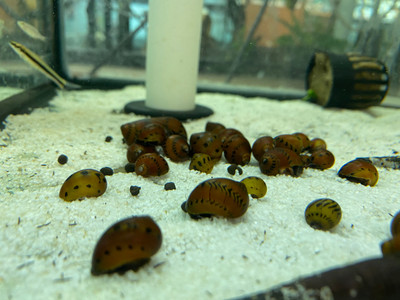Nerite Snail
Posted by Max Gandara on on 30th Nov 2023
The Nerite Snail (Neritina spp.) is a fascinating and beneficial
addition to freshwater and marine aquariums. Known for their striking
shells, algae-eating habits, and ease of care, Nerite Snails have become
popular among aquarium enthusiasts seeking effective and attractive
scavengers for their tanks.
Nerite Snails are characterized by their robust and ornate shells, which
vary in color and pattern depending on the species. The most common
varieties include Zebra Nerite Snails (Neritina natalensis) with black
and gold stripes, Tiger Nerite Snails (Neritina granosa) with dark brown
and light brown stripes, and Olive Nerite Snails (Vittina
coromandeliana) with a smooth olive-green shell.
Nerite Snails are well-suited to a variety of aquarium setups, making
them versatile additions to both freshwater and marine tanks. They
thrive in well-maintained environments with stable water parameters.
Providing hiding spots, such as small caves or decorations, and a
substrate that allows for burrowing enhances their well-being.
Maintaining stable water conditions is crucial for the health of Nerite
Snails. They prefer slightly alkaline to neutral water with a pH range
of 7.0 to 8.5. The water temperature should be kept between 72 and 78
degrees Fahrenheit (22 to 26 degrees Celsius). Regular water changes
help ensure optimal water quality.
Nerite Snails are renowned for their exceptional algae-eating abilities,
making them valuable additions to aquariums. They feed on various types
of algae, including green spot algae, diatoms, and soft green algae.
However, if the tank doesn't provide enough natural algae, supplementing
their diet with algae wafers or blanched vegetables like zucchini
ensures they receive sufficient nutrition.
These snails are generally peaceful and spend much of their time grazing
on surfaces, including glass, rocks, and decorations, in search of
algae. Nerite Snails are compatible with a wide range of tank mates,
including community fish and other invertebrates. However, it's
essential to avoid housing them with aggressive or carnivorous species
that may harm or prey on them.
While Nerite Snails lay eggs, they do not reproduce successfully in
freshwater aquariums. The eggs, which are usually deposited on hard
surfaces, such as glass or rocks, require brackish or marine conditions
for successful hatching and larval development. As a result, aquarists
often find Nerite Snail eggs in their tanks, but they do not lead to an
overpopulation of snails.
One challenge with Nerite Snails is their tendency to lay hard,
unsightly eggs on various surfaces. While these eggs do not hatch in
freshwater aquariums, some aquarists may find them undesirable.
Scrubbing the eggs off surfaces can be challenging due to their
resilience.
Nerite Snail is a valuable and visually appealing addition to freshwater
and marine aquariums. Their algae-eating habits contribute to a cleaner
tank, and their unique shell patterns enhance the aesthetic appeal of
the aquatic environment. With proper care and consideration of their
preferences, Nerite Snails can thrive and provide both functional and
ornamental benefits to aquarium enthusiasts.

